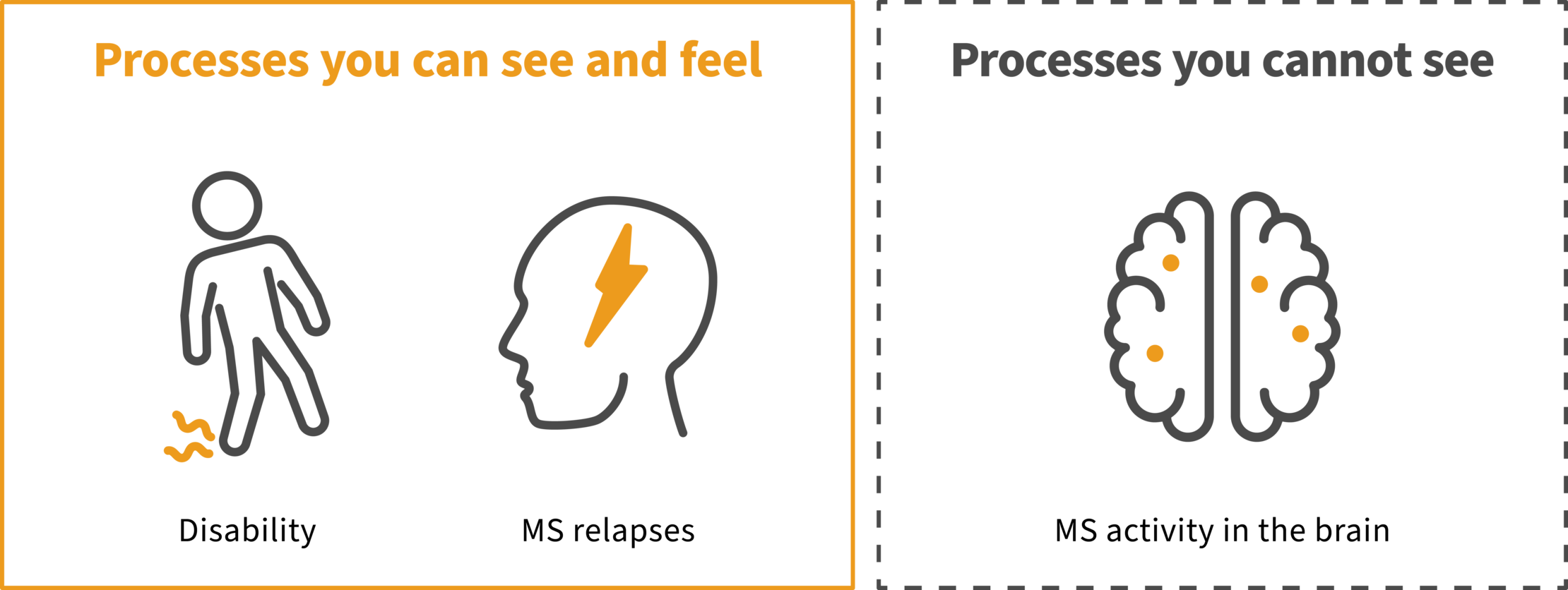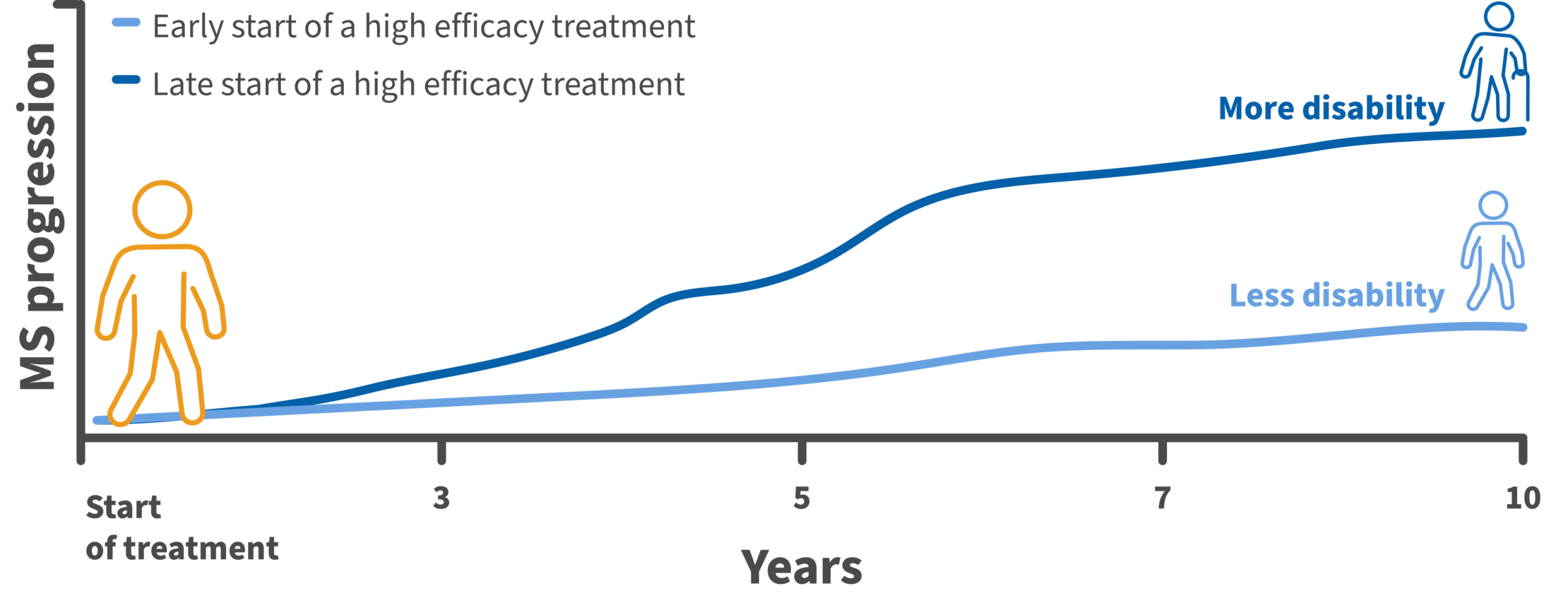Knowledge is power
The more you know about your multiple sclerosis (MS), the better you will be prepared to shape your future. The more you know, the better the discussions you'll have with your doctor and the more you'll understand.
In MS, there are activities we can see (disability and MS relapses) and activities that we can't see (MS activity in the brain). MS can manifest itself in visible, noticable ways (e.g. relapses) but also in more subtle ways, detectable only by magnetic resonance imaging (MRI). Understanding your disease allows you to make informed choices, especially regarding your treatments. Non-visible processes should also be taken seriously and any adjustments to treatment should be discussed with your treating neurologist.

Finding the right balance for you
Science has made great progress in developing MS treatments. But each treatment has its advantages and disadvantages, from its effectiveness, to its side effects, to how the mediaction must be taken. How do you choose your treatment together with your doctor?
Efficacy

Very efficient or less efficient treatments? What's best for you?
Side effects

Which ones? How to deal with them?
Administration

How and how often do you take your medication?
If you're starting treatment for MS or switching to a new treatment, talk to your doctor about how to find a treatment that meets your needs and works for you.
Early treatment of disease activity
Early treatment of disease activity with high efficacy treatment can make a difference in the future. Researchers have found that starting with a high efficacy – and therefore more efficacious – treatment to prevent and delay MS damage can make a big difference over time.
People who started high efficacy treatment at the beginning of their MS had better results than those who started the same treatment later.

Even if you don't have symptoms, MS can continue to do lasting damage to your body. So early treatment can make a big difference.
Multiple sclerosis: setting goals
MS affects everyone differently. Yet everyone wants to have more control over their disease. You and your doctor can work together to define your goals and ensure that you are living the life you want.
As a rule, the doctor's goal is to check three important points:
Disability
progression

If the disability progresses over time, your brain will have a harder time repairing itself and adapting to neurological changes.
Relapses of MS

Relapses lead to a gradual progression of the disability. Some disabilities do not regress completely.
Disease activity

Lesions detected by MRI (magnetic resonance imaging) can show where there is disease activity and indicate the likelihood of a relapse and worsening of disability.
When these three components are stationary, doctors refer to this as "No Evidence of Disease Activity" (NEDA-3), which means that the MS is not currently active and is not causing any damage, and there is less chance of the disability getting worse in the future.
It's important to find a treatment for MS that helps contain the activity as soon as possible. The steps you and your doctor take today can have a big impact on your future.
Prepare for your next consultation
You can take an active role in making decisions with your doctor. By knowing more, you'll feel better prepared to have important discussions about your future with MS. Talking to your doctor about MS treatment can give you more control over your life so you can live the way you want.
Fill out the Your MS Questionnaire to gather information about your symptoms, goals, and the impact of MS on your daily life.
Swiss Multiple Sclerosis Society, https://www.multiplesklerose.ch/fr/ (last accessed 10/07/2024).
Neurologen und Psychiater im Netz über Multiple Sklerose (MS) https://www.neurologen-und-psychiater-im-netz.org/neurologie/erkrankungen/multiple-sklerose-ms (in German, last accessed 10/07/2024).
Atlas of MS 3rd edition. MS International Federation, https://www.atlasofms.org/map/global/epidemiology/number-of-people-with-ms, (last accessed 10/07/2024).
AMSEL e. V. Deutscher Verband für MS-Betroffene www.amsel.de (in German, last accessed 10/07/2024).
National Institute of Neurological Disorders and Stroke https://www.ninds.nih.gov/Disorders/Patient-Caregiver-Education/Hope-Through-Research/Multiple-Sclerosis-Hope-Through-Research#whatisMS (last accessed 10/07/2024).
MS Trust https://mstrust.org.uk/ (last accessed 10/07/2024).
Giovanni G et al. Brain health Time matters in multiple sclerosis https://www.msbrainhealth.org/wp-content/uploads/2021/05/brain-health-timematters-in-multiple-sclerosis-policy-report.pdf (last accessed 11/07/2024).
Atlas of MS 3rd edition. MS International Federation. https://www.msif.org/wp-content/uploads/2021/05/Atlas-3rd-Edition-clinical-managementreport-EN-5-5-21.pdf (last accessed 11/07/2024).
Filippi M et al. Early use of high-efficacy disease-modifying therapies makes the difference in people with multiple sclerosis: an expert opinion. J Neurol. 2002. 269(10):5382-5394. https://pubmed.ncbi.nlm.nih.gov/35608658/ (last accessed 11/07/2024).